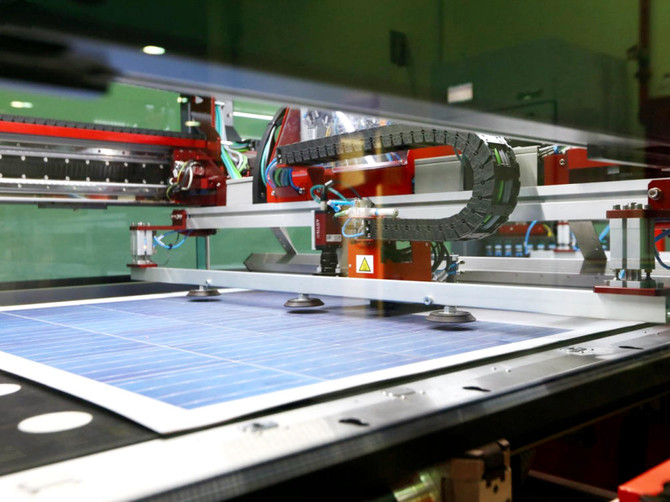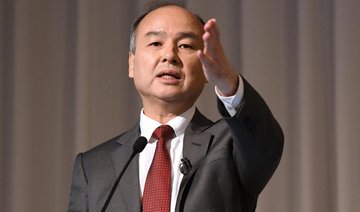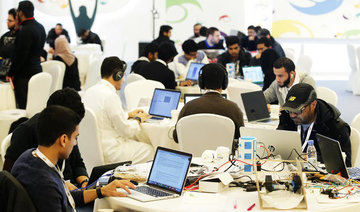Saudi Arabia has unveiled plans to transform its solar power production, in line with the Vision 2030 strategy to diversify the country’s economy and end its reliance on oil.
Under the Solar Power Project Plan 2030, the Kingdom expects to produce 200 gigawatts of solar energy by 2030, according to the Saudi Press Agency (SPA).
At the launch of the plan, experts said the project will transform the Kingdom into a leading exporter of sustainable energy, thanks to its natural resources and environmentally friendly industries relying on sun, wind, and sand rich in silica.
Solar power will be the world’s largest energy source by 2050, according to the International Energy Agency.
The Saudi solar initiative will help to diversify the national economy and stimulate investment in non-oil industries. The project will also reduce solar power production costs and create employment opportunities for Saudi workers, with up to 100,000 jobs in solar power schemes alone.
Meanwhile, King Saud University in Riyadh has joined a research project with Japan and Peru to monitor changes in the sun and their effects on Earth.
The Kingdom’s history of solar research goes back 38 years, when King Salman opened the research plant at King Abdul Aziz City — the first solar power site in the Kingdom. The plant provided solar electricity to Uyayna, Jubaila and rural centers near Riyadh.
The solar village, part of a Saudi-US partnership, produces 350 kilowatts of electricity through concentrated photovoltaic complexes.
Crown Prince Mohammed bin Salman has outlined Saudi Arabia’s transformation into a “Kingdom of Sustainable Energy” era within five months. In October 2017, Riyadh hosted the beginning of the development of the strategy (Solar Plan 2030) with the participation of the Public Investment Fund and Softbank Vision Fund.
On March 28, during his groundbreaking visit to the US, the crown prince signed a memorandum of understanding with Softbank Vision Fund to create a plant for the project, which would be completed and ready to start production of solar energy by early 2019.
Prince Turki bin Saud bin Mohammed, president of King Abdul Aziz City for Science and Technology, said: “Saudi Arabia’s current energy needs are 75 gigawatts. The 2030 solar plan would enable the Kingdom to export surplus electricity and thus provide alternative energy to the Kingdom’s oil.”
Saudi Arabia to become major solar power exporter under new plan
Saudi Arabia to become major solar power exporter under new plan

- Kingdom aims to produce 200 gigawatts of solar energy by 2030
- Up 100,000 new jobs expected in solar power schemes alone
First flights carrying Hajj pilgrims from Turkiye land in Saudi Arabia

- Qualified staff fluent in several languages and equipped with the latest technology will help simplify entry procedures for pilgrims
Madinah: The first flights carrying Hajj pilgrims from Turkiye arrived at Prince Mohammad bin Abdulaziz International Airport in Madinah on Wednesday. The annual Islamic pilgrimage is set to take place this year between June 4 and 9.
Authorities are providing qualified staff who are fluent in several languages and equipped with the latest technology to help simplify entry procedures for pilgrims, the Saudi Press Agency reported, and are ready to assist people arriving by land and sea as well as air.
An estimated 1.8 million pilgrims participated in Hajj last year.
Jeddah communication conference explores anime’s digital evolution

- The session focused on anime’s shift from traditional television broadcasts and DVDs to digital platforms, including live streaming, instant subtitling and cloud-based production
RIYADH: The eighth session of the Digital Communication Conference, titled “Anime in the Digital Space,” explored the transformation of Japanese anime over the past two decades, highlighting the impact of digital innovation and the internet.
According to Saudi Press Agency, the session focused on anime’s shift from traditional television broadcasts and DVDs to digital platforms, including live streaming, instant subtitling and cloud-based production.
Streaming giants such as Netflix, Crunchyroll, and Funimation were highlighted as pivotal players in the transition, offering translated or dubbed episodes immediately upon release and funding original series such as “Devilman Crybaby” and “Cyberpunk: Edgerunners.”
Speakers in the session, including Manga Productions CEO Essam Bukhary, said that social media and online forums have opened the door to unprecedented engagement among fans, as well as community and cultural interaction, since audiences now take part in evaluating episodes.
Concerns were raised that heavy dependence on technology could erode the handcrafted aesthetic that defines traditional anime.
Saudi Arabia’s burgeoning interest in manga and anime, which dates back to the 1970s, is helping to usher in a revolution in cultural production.
Japanese art forms have captivated audiences of all ages, gaining significant popularity in recent years. Their ability to combine entertainment, culture and education has made them of great interest to Saudi society.
To support this interest, the General Entertainment Authority has hosted events like the Saudi Anime Expo, drawing international visitors.
In line with these efforts, the ministries of culture and education launched the Manga Education program to nurture student talent, as well as integrate arts and culture into public education.
Muslim World League chief meets UK Islamic leaders in Madinah

- Delegation visits International Fair and Museum of the Prophet’s Biography
- Visitors reaffirm support for Palestinian cause, call for end to genocide in Gaza
LONDON: The secretary-general of the Muslim World League, Mohammed bin Abdulkarim Al-Issa, met British Islamic leaders in Madinah on Wednesday to discuss issues facing the UK’s Muslim community.
The visitors praised the MWL’s important role in the Islamic world and among Muslim minorities in Europe and the UK, highlighting its work to preserve cultural and religious identities.
They also noted that King Charles welcomed Al-Issa as the first Arab and Muslim figure from outside the UK to visit Buckingham Palace after his coronation.
The delegation visited the MWL-affiliated International Fair and Museum of the Prophet’s Biography, which tells the story of the Prophet Muhammad’s life.
During the talks they reaffirmed their support for the Palestinian cause and called for an “immediate end to the genocide being perpetrated against the people of Gaza by the brutal war machine of the Israeli occupation government.”
Gaza should be a symbol of unity, not division, among Muslim communities, they said, according to an MWL statement.
The delegation commended the 2019 Charter of Makkah, saying it helped foster interaction with non-Muslim audiences and promoted moderation in addressing contemporary issues.
Saudi deputy foreign minister receives Russia’s envoy in Riyadh

Saudi Arabia’s Deputy Minister for Political Affairs Saud Al-Sati received Russian Ambassador Sergey Kozlov in Riyadh on Wednesday.
The pair discussed relations between their countries and other topics of common interest, the Foreign Ministry wrote on X.
Also on Wednesday, Saudi Ambassador to Pakistan Nawaf bin Said Al-Malki met Digital Cooperation Organization Secretary-General Deemah Al-Yahya in Islamabad, the diplomat wrote on X.
They discussed the importance of digital transformation and other topics of interest.
Saudi Arabia welcomes Rwanda, DRC declaration to draft peace deal

RIYADH: Saudi Arabia has welcomed the signing of a declaration of principles between the governments of the Democratic Republic of the Congo and Rwanda.
The Ministry of Foreign Affairs said it appreciated the diplomatic efforts made by the two sides and looked forward to their commitment to the declaration, which would enhance security and stability, the Saudi Press Agency reported.
The foreign ministers of Rwanda and the DRC signed a declaration at the US State Department on Friday. They agreed to draft a peace deal by May 2, respecting each other’s sovereignty and refraining from supporting armed groups after fighting resumed in the DRC’s mineral-rich east in October.






















